2008年5月26日
种----族
参与了“艺树人”在前两个星期五呈现的活动,从中好像更了解自己对于种族关系的想法。
1)Race In Schools - SteReotypes And OtheRs
在参与当中的一些游戏时,我很惊奇地发现我们很多人原来在无形中对一些人或一组人持有一些刻板的印象。例如:很多人都认为印族同胞说话时很大声、而且很爱说话还有喜欢为自己的行为辩护。(注:我只是举出一些在活动中出现的情况,并非有心针对任何族群)
经过大家积极地参与和讨论,我听到很多有趣的故事和亲身经历。听着在场的人叙述他们的经历不禁让我盟生一个问题:我们对于其他族群的刻板印象究竟是我们个人的偏见亦或者是有一定的真实?所谓无风不起浪。
当然,尽管我有这样的疑问,我还是不赞成把任何族群定型,更反对用我们持有的刻板印象去看待其他族群的人。我想很多人都很了解并且也知道,什么样的行为是对的、是好的。例如:我们都知道对于其他族群的同胞们必须有一定的敏感度。可是,知道的和真正能够感受的毕竟不完全一样吧。
身为华人,也许我们太习惯属于社会的 majority,因此要忽略少数族群的感受,绝对不是不可能的。
生活中,我也遇过一些让我有所领悟的事情。嗯,例如我认识一个印族同学——我一直没有问她的宗教是什么,而我也在无形中认为她是兴都教的信徒。后来,我终于问她,然而我得到的答案并不如我所想像的。原来,她是回教徒(Indian Muslim)。这个经历让我开始思考我们是不是习惯性地把种族和宗教这两个其实没有任何特定关系的概念联想在一起?我们理所当然认为马来人就是回教徒、印度人就是兴都教徒。然而,我发现我们却没有把华人看成佛教徒啊!为什么我们可以接受并且不事先以为华人是佛教徒,可是对于马来人或印度人却有事先的判断呢?
在活动中,演讲者也提到“name-calling” 这一点。听她提起这一点,我便想起我在学校电梯里听到的一番对话。当时,两名学生在讨论考试成绩。他们说到关于每次考试名列前茅的外国学生时(多数是来自中国和印度的学生),用了两个名称来称呼他们—“Ah Tiong”(中国人) 和“KLK”(
Keh Leng Kia/印度人)。的确,我想类似这种不礼貌的名称对我们并不陌生。
最后,我今天到了小印度。那里到处都是印度人,只有一些华人。当下,我能够想像少数族群的朋友平时置身在多数是华人的社会中,有什么感受。我在小印度,虽然和周围的人保持友善的关系,店员也对我很友善,但是在心里深处总是有一点的不安。因为我毕竟离开了我所熟悉的人和文化,而且对于对方的文化我其实并不非常理解。
所以,我想,我们必须时时刻刻提醒自己“种族和谐”这样的情况其实建立在一个极为脆弱的基础上。因为我们扪心自问,我们并没有做到对其他种族的文化等有一定的了解。我们只不过是在相处的层面上,能够维持一定的礼貌和不干涉。那,我们想要的“种族和谐”是不是仅停在这个层面?还是,我们要真的用心去维系种族之间的关系?
Race
During the games and activities, I was surprised to find that most of us actually held similar sets of stereotypes for certain groups of people. For example, many of us felt that Indians are loud, talkative and argumentative. (*Note: For my purpose, I am purely highlighting what happened during the discussion and activities. It is not my intention to deliberately pick on certain groups of people)
I heard many interesting stories from people’s sharing of their experiences. As I listen to their stories and why they come to hold certain sets of stereotypes for particular groups, I started to have a question in my mind: Are the stereotypes that we come to hold about certain groups a result of our narrow-mindedness and prejudice or are they really based on some level of truth?
Naturally, even as I question the level of truth in our stereotypes, I am still against classifying a group of people under “tags” and “stereotypes”. I am even more against judging people who belong to certain groups based on prior stereotypes of the group. I guess many of us understand and are aware of what kind of behaviour is “correct”, what kind of behaviour is “good”. For instance, we know that we ought to be sensitive towards other racial groups. However, what we know and what we truly feel are not exactly the same, are they?
As Chinese, we are perhaps so used to being part of the majority of society that it is not impossible to neglect the feelings of the minority groups of people.
I have had some personal experiences which taught me things about myself and other people. I know an Indian school mate. I never asked her for her religion and I had somehow assumed that she was a Hindu. Finally, I asked her if she was Hindu, and the answer she gave me was beyond what I had expected. I learned that she was an Indian Muslim. This experience I had made me question our tendency to make a false connection between religion and race. We are used to thinking that Malays are Muslims, Indians are Hindus. However, it seems unfair that we have come to accept that not all Chinese are Buddhists but we still cannot seem to do the same for Malays and Indians.
During the talk, the speaker-facilitator mentioned the point on “name-calling”. I recall a conversation I heard in the lift of my school. Two students were discussing about their recent examinations results. When they were on the topic of the foreign scholars who always topped the class, they used terms like “Ah Tiong” (China Scholars) and “KLK (Keh Leng Kia)” (Indians) to address these groups of people. The fact is, such impolite terms are not new to us.
Lastly, I happened to be in Little India today. The place was filled with Indians, with the exception of a few Chinese. At that moment, I can really feel what the Indians and Malays probably feel when they are in the midst of Chinese. Although I had an enjoyable experience with the people at Little India, I still felt insecure sometimes because this was not the environment and culture that I am familiar with, and I also did not know much about their culture.
Hence, I feel that the “racial harmony” that we have in Singapore today is probably built on a rather weak foundation. We most probably know very little regarding the culture and lives of the other racial groups. All that we have managed to do are to maintain cordial relations as well as keeping out of each other’s matters. Then, what is the kind of “racial harmony” that we really wish to have? Do we want to keep on maintaining relations on a superficial level or do we want to go beyond that to really try to understand a different culture from ours?

许慧铃 Koh Hui Ling
艺术总监 Artistic Director
 母性泛滥; 热爱人
母性泛滥; 热爱人
着重于戏剧/剧场的应用与教学法
Overpowering maternal instincts
Loves Human(ity)
Aims at developing the use of applied drama / theatre
梁海彬 Neo Hai Bin
 长着翅膀
长着翅膀
在剧场里翱翔...
一个
鸟人。
The world's a stage...
I'm in the latecomer's queue.
刘佳宜 Liew Jiayi
 我在南大念心理学科。心理学对我来说,跟戏剧的妙处不相上下。
我在南大念心理学科。心理学对我来说,跟戏剧的妙处不相上下。
越做,越发现,我懂得不多。越不懂,就越想发现,越想继续做 (:
I am currently an undergrad in NTU. My major is psychology and the most common question asked when I reveal that fact is whether I can read his/her mind. Honestly, I cannot lah. Currently, I am daydreaming about my future hoping to achieve 2 things i enjoy alot in life: Theatre and Psychology (:
林丹凤 Lam Dan Fong
 就读南洋理工大学。
就读南洋理工大学。
习惯催眠自己就读的科目与艺术(剧场)有关。还在探索当中。
2012年5月毕业后,领悟到了答案再跟大家分享。
Studying Accountancy in NTU and living a second life in theatre, where (fortunately) the former will end in 2012 May. Believes that there is a connection between numbers and the arts, or maybe, I am just living in denial all the time.
林慧萍 Lim Hwee Peng
 法律系学生。
法律系学生。
正在面临"刻年"危机。
志愿当长发公主。
Law student.
Currently experiencing "quarter-life" crisis.
Aspiring Rapunzel.
张英豪 Teo Eng Hao
 正值后青春期的门槛状态。
正值后青春期的门槛状态。
剧场爱好者,正在学习做个剧场人。
热血梦想:征服全世界,或,不被世界驯服。
励志宣言:剧场就是Play! 让我们一起玩转地球!
A post-graduate student from NTU Division of Chinese.
韩雪梅 Han Xuemei
 热爱的东西太多,拥有的时间有限。
热爱的东西太多,拥有的时间有限。
记性日渐退化,一年比一年老。
Carries an overwhelming amount of passion for an overwhelming number of things, coping with the limited amount of time.
Struggling against a degenerating capacity to remember, and aging year by year.
Like anybody else.
王放 Kate
 在国大读书.
在国大读书.
写这个东西简直比写任何论文还难!
An undergrad at NUS.
Coming out with this line is harder than any paper I've ever written.
谢秀彬 Entia Seah Siew Ping
 南大中文系毕业。非常健忘,经常丢三落四。
南大中文系毕业。非常健忘,经常丢三落四。
热爱教育,喜欢和人接触。
Some people say that I look like an ah-lian when I’m quiet and sounds like an auntie when I speak.
I embrace all these comments and aspire to be an elegant ah-lian and intelligent auntie!
何健僮 Ho Jian Tong
 在2009年毕业于新加坡国立大学的科学系。由于我目前还在学习编剧和导戏的工作,未能有值得一提的代表作。
在2009年毕业于新加坡国立大学的科学系。由于我目前还在学习编剧和导戏的工作,未能有值得一提的代表作。
Graduated from “The Brainforest of Clementi” with an Honours degree in Life Sciences. As I am currently learning to write and direct plays properly, I do not have any work that is worthy of mention as yet.
骆丽诗 Myra Loke
 爱与剧场牵手,与社会学接吻。
爱与剧场牵手,与社会学接吻。
Sometimes we need to be crazy, to be human.
陈玮婷 Tan Wei Ting
 艺树人面试那一天,我告诉许慧铃:"其实我想要做的是电影。"
艺树人面试那一天,我告诉许慧铃:"其实我想要做的是电影。"
南大电影系上课头一天,我告诉教授:"其实我要做的是剧场。"
三年的时间找一找自己,也够了。
I started doing Theatre thinking that I want to do Film.
Now I'm studying Film determined to do Theatre.
Funny yea?
2008年5月26日
种----族
参与了“艺树人”在前两个星期五呈现的活动,从中好像更了解自己对于种族关系的想法。
1)Race In Schools - SteReotypes And OtheRs
在参与当中的一些游戏时,我很惊奇地发现我们很多人原来在无形中对一些人或一组人持有一些刻板的印象。例如:很多人都认为印族同胞说话时很大声、而且很爱说话还有喜欢为自己的行为辩护。(注:我只是举出一些在活动中出现的情况,并非有心针对任何族群)
经过大家积极地参与和讨论,我听到很多有趣的故事和亲身经历。听着在场的人叙述他们的经历不禁让我盟生一个问题:我们对于其他族群的刻板印象究竟是我们个人的偏见亦或者是有一定的真实?所谓无风不起浪。
当然,尽管我有这样的疑问,我还是不赞成把任何族群定型,更反对用我们持有的刻板印象去看待其他族群的人。我想很多人都很了解并且也知道,什么样的行为是对的、是好的。例如:我们都知道对于其他族群的同胞们必须有一定的敏感度。可是,知道的和真正能够感受的毕竟不完全一样吧。
身为华人,也许我们太习惯属于社会的 majority,因此要忽略少数族群的感受,绝对不是不可能的。
生活中,我也遇过一些让我有所领悟的事情。嗯,例如我认识一个印族同学——我一直没有问她的宗教是什么,而我也在无形中认为她是兴都教的信徒。后来,我终于问她,然而我得到的答案并不如我所想像的。原来,她是回教徒(Indian Muslim)。这个经历让我开始思考我们是不是习惯性地把种族和宗教这两个其实没有任何特定关系的概念联想在一起?我们理所当然认为马来人就是回教徒、印度人就是兴都教徒。然而,我发现我们却没有把华人看成佛教徒啊!为什么我们可以接受并且不事先以为华人是佛教徒,可是对于马来人或印度人却有事先的判断呢?
在活动中,演讲者也提到“name-calling” 这一点。听她提起这一点,我便想起我在学校电梯里听到的一番对话。当时,两名学生在讨论考试成绩。他们说到关于每次考试名列前茅的外国学生时(多数是来自中国和印度的学生),用了两个名称来称呼他们—“Ah Tiong”(中国人) 和“KLK”(Keh Leng Kia/印度人)。的确,我想类似这种不礼貌的名称对我们并不陌生。
最后,我今天到了小印度。那里到处都是印度人,只有一些华人。当下,我能够想像少数族群的朋友平时置身在多数是华人的社会中,有什么感受。我在小印度,虽然和周围的人保持友善的关系,店员也对我很友善,但是在心里深处总是有一点的不安。因为我毕竟离开了我所熟悉的人和文化,而且对于对方的文化我其实并不非常理解。
所以,我想,我们必须时时刻刻提醒自己“种族和谐”这样的情况其实建立在一个极为脆弱的基础上。因为我们扪心自问,我们并没有做到对其他种族的文化等有一定的了解。我们只不过是在相处的层面上,能够维持一定的礼貌和不干涉。那,我们想要的“种族和谐”是不是仅停在这个层面?还是,我们要真的用心去维系种族之间的关系?
Race
During the games and activities, I was surprised to find that most of us actually held similar sets of stereotypes for certain groups of people. For example, many of us felt that Indians are loud, talkative and argumentative. (*Note: For my purpose, I am purely highlighting what happened during the discussion and activities. It is not my intention to deliberately pick on certain groups of people)
I heard many interesting stories from people’s sharing of their experiences. As I listen to their stories and why they come to hold certain sets of stereotypes for particular groups, I started to have a question in my mind: Are the stereotypes that we come to hold about certain groups a result of our narrow-mindedness and prejudice or are they really based on some level of truth?
Naturally, even as I question the level of truth in our stereotypes, I am still against classifying a group of people under “tags” and “stereotypes”. I am even more against judging people who belong to certain groups based on prior stereotypes of the group. I guess many of us understand and are aware of what kind of behaviour is “correct”, what kind of behaviour is “good”. For instance, we know that we ought to be sensitive towards other racial groups. However, what we know and what we truly feel are not exactly the same, are they?
As Chinese, we are perhaps so used to being part of the majority of society that it is not impossible to neglect the feelings of the minority groups of people.
I have had some personal experiences which taught me things about myself and other people. I know an Indian school mate. I never asked her for her religion and I had somehow assumed that she was a Hindu. Finally, I asked her if she was Hindu, and the answer she gave me was beyond what I had expected. I learned that she was an Indian Muslim. This experience I had made me question our tendency to make a false connection between religion and race. We are used to thinking that Malays are Muslims, Indians are Hindus. However, it seems unfair that we have come to accept that not all Chinese are Buddhists but we still cannot seem to do the same for Malays and Indians.
During the talk, the speaker-facilitator mentioned the point on “name-calling”. I recall a conversation I heard in the lift of my school. Two students were discussing about their recent examinations results. When they were on the topic of the foreign scholars who always topped the class, they used terms like “Ah Tiong” (China Scholars) and “KLK (Keh Leng Kia)” (Indians) to address these groups of people. The fact is, such impolite terms are not new to us.
Lastly, I happened to be in Little India today. The place was filled with Indians, with the exception of a few Chinese. At that moment, I can really feel what the Indians and Malays probably feel when they are in the midst of Chinese. Although I had an enjoyable experience with the people at Little India, I still felt insecure sometimes because this was not the environment and culture that I am familiar with, and I also did not know much about their culture.
Hence, I feel that the “racial harmony” that we have in Singapore today is probably built on a rather weak foundation. We most probably know very little regarding the culture and lives of the other racial groups. All that we have managed to do are to maintain cordial relations as well as keeping out of each other’s matters. Then, what is the kind of “racial harmony” that we really wish to have? Do we want to keep on maintaining relations on a superficial level or do we want to go beyond that to really try to understand a different culture from ours?

艺树人的过往镜头
_______________________________________________________________________
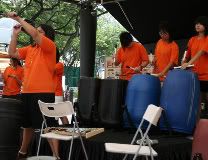
- The FLAMES利用环保乐器所带来的精彩表演
补天计划之《绿吗?》
2008年1月
《绿吗?》是戏剧盒08年以环保为主题的社区演出系列的一部分。
艺术人希望通过此活动,让公众,特别是青少年,对环境有更深的认识,并且更了解自己对环境造成的影响。
《父。女花》
编剧: 林丹凤
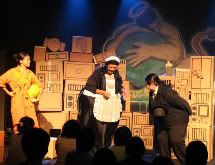
- 艺树人呈献的戏剧小品
创作灵感取自柯思仁《梦树观屋》中一句:
“砍倒一棵树,可以再种。对人类来说,这只是一件微不足道的事”。
剧中描述的是女儿面对父亲酗酒赌钱,因而要她把心爱的花卖掉的抉择。
《塑料杀死猫》
编剧: 何健僮
一个神秘女子为了名利而开始进行实验,培植一种智慧崇高的动物。因为要去远行休息,女子把实验品交给了她的管家照顾。
可是实验出现了无法想象的变化,因而对豪宅与人类的安全造成了威胁。
最终,为了把家中的大害除掉,她和管家与一手创造的动物大动干戈!
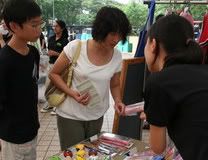
- 非一般的小型户外市集
协助编剧:郭庆亮
执导:许慧铃
返回页顶
_______________________________________________________________________
Project Mending Sky: THE GREEN MAN!
January 2008
The Green Man is part of Drama Box’s community project on Environment.
Conceptualized and organized by ARTivate, the event consists of:
- - ARTivate’s thought-provoking plays on environmental conservation
- - “The Flames” musical performance by girls from Andrew & Grace Home
- - A mini bazaar that promotes environmental conservation
Selfish, written by Lam Dan Fong, reveals a story about the decision of a daughter -
to escape into a perfect new world or remain in the world of self destruction.
Plasti-City Kills the Cat written by Ho Kian Tong, explores the harm brought about by plastics to the environment.
The plays are written under the dramaturgy of Kok Heng Leun and directed by Koh Hui Ling.
返回页顶
_______________________________________________________________________
What Matters?
July 2008

What Matters? is a package of one forum theatre play and three fringe activities which explores the issue of race with the youths of today.
Through the series of fringe activities and the Forum Theatre play, ARTivate aims to probe further into the awareness of racial issues with the youths of today and understand the true meaning of harmony between races.
Forum Theatre Play
3 students of different races set up an Adventure Club in school. As they prepare to go on a new adventure to search for fugitive Mas Selamat in their club room, an accident happened in the school and conflicts arose within the group.
*The play is performed mainly in English with some Mandarin and Malay
Fringe #1: Race in School – Stereotypes and Others
The youths were asked to move, play, think and discover, thus finding the way of dealing with racial issues in real life.
Fringe #2: Movie screening – To Kill a Mocking bird
Based on the novel by Harper Lee, this award-winning classic film present racial issues vividly on screen.
There was a discussion session after the screening facilitated by Mr. Danny Yeo.
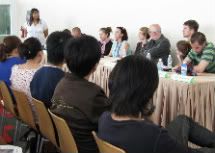
- Sharing by young actors of Class Enemy from Bosnia
Fringe #3: Survival Ethnic Conflicts in Bosnia – a Singapore Arts Festival programme
Sharing by young actors of Class Enemy from Bosnia on their personal experiences of the war-torn times and how they have learnt to cope with growing up in an environment filled with violence caused by racial and ethnic conflicts.
Speaker: Director Haris Pasovic and the cast of CLASS ENEMY (East West Theatre Company)
返回页顶
_______________________________________________________________________
Project Mending Sky: Movie Screening
August 2008
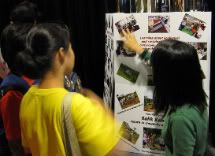
- Learning about the environment
The Movie Screening is the second installment of Project Mending Sky: The Green Man, held in conjunction with Project Mending Sky: ME (补天计划之我).
Through movie screenings and post-movie discussion sessions ARTivate hopes to explore issues surrounding our Earth’s survival amidst the damages we are inflicting on her.
Documentary-Movie #1: Winged Migration
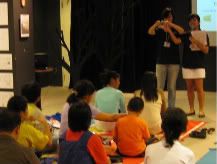
- Teaching the audience how to make dustbins using flyers
Directed by Jacques Perrin, a noted actor and film producer in France, this Academy Award nominated movie records the flight of dozens of different birds from around the globe as they follow their navigational instincts and make the taxing journey to more temperate climates in the fall.
Documentary -Movie #2: The Greening of Cuba
Cuban farmers and scientists working to reinvent a sustainable agriculture based on ecological principles and local knowledge rather than imported agricultural inputs which remind us that developed and developing nations alike can choose a healthier environment and still feed their people.

- The audience sharing
Documentary -Movie #3: The Power of Community
A follow-up to The Greening of Cuba 10 years later to see how the Cuban transitioned from a highly mechanized, industrial agricultural system to one using organic methods of farming and local, urban gardens.
Discussions facilitated by: Mr Danny Yeo and Mr Tay Lai Hock
*Language: English (with English subtitles)
返回页顶
_______________________________________________________________________
《 城S 》
2009年7月
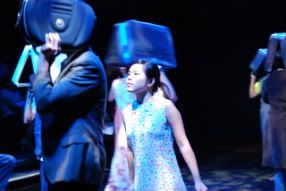
《城S》是艺树人首个以集体创作的方式完成的作品也是艺树人经过一年演员及编剧培训后的首个演出。在集体创作引导者郭庆亮和导演许婉婧的指导下,艺树人尝试了各种即兴表演,经过不断的试验剧本才达到了令人满意的成果。
《城S》以新加坡社会和现今高度融合及环球化的世界作为语境,对城市包容性的概念进行探索。
剧中的故事呈现城市的各个面向并由一系列的行李箱奏鸣曲所串连。行李箱奏鸣曲象征了一个旅程,让大家通过这个旅程反思多数人如何建构与看待社会中的意识形态。
在剧中,转制的体制,不和谐的状况,受歧视,被限制,被异化,被压抑等诸如此类的现实情况将被正视。多数人所作的决定能代表少数人的意见吗?在这场力争上游的竞赛中,精英又是否会考虑到一般老百姓的福利呢?你的言行举动是出自你的本意又或是受到其他人的影响?
艺树人希望观众能够通过观赏此剧重新思考真正具有包容性的城市所蕴含的意义再回答自己这些问题。
由艺树人集体创作和演出, 郭庆亮担任集体创作引导者, 许婉婧(戏剧盒艺术工作伙伴)导演.
*演出主要以中文进行。(提供英文字幕)
返回页顶
_______________________________________________________________________
CityS
July 2009
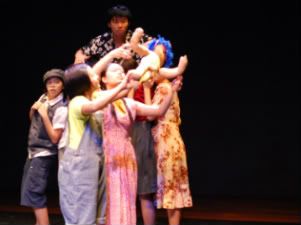 Part of a double-bill during
Part of a double-bill during
Singapore Drama Educators Association (SDEA) Celebrate Drama 2009
“CityS” is ARTivate’s first devised play. It is also ARTivate’s debut presentation following a year-round capacity-building process, during which the ARTivators underwent a series of training involving acting and playwrighting.
It is conceived and brought to satisfactory theatrical fruition by the collaboration of all ARTivators via a gradual process and accumulation of brainstorming and improvisation, under the guidance of devising facilitator Kok Heng Leun and director Koh Wan Ching.
“CityS” explores the concept of an inclusive city, in Singapore’s context, and in the context of our current highly integrated, globalised world.
In this play, stories from different aspects of a city are connected by a series of luggage sonatas which symbolizes a journey that questions the ideology constructed and perceived by majority of the society. Realities are confronted: autocracy, disharmony, discrimination, limitations, alienation, oppression and the likes. Does the decision of the majority always account for the minority? Will the elites ever consider the welfare of their downtown folks in this race to the top? Is that action you took out of free will or under the influence of others?
ARTivate hopes that audiences will reconsider the meaning of a truly inclusive city after watching the play and in turn, answer these questions for themselves.
Devised and performed by
ARTivateDevising facilitated by
Kok Heng Leun Directed by
Koh Wan Ching
*Performed mainly in Mandarin. (English Surtitles provided)
返回页顶
_______________________________________________________________________
《嘘… 审查:论坛剧场演出》
2010年9月

为了提高人们对审查制度的意识并让大家了解审查如何渗透生活,这个演出原本准备使用具象征性的舞台设计并进行现场音乐伴奏,冲破语言和种族的障碍让观众发现审查的力量。演出以5个小品组成,是艺树人经过5个月严密训练创作的结晶。
然而,距离演出仅剩三周的时候,新加坡媒体发展局告知我们户外表演执照不被批准。由于短剧探讨”敏感”课题,当局要求演出必须附上“含有成人议题”的说明并声称只有在室内演出,才能有效地执行说明。
因此,我们最后决定取消原本的演出,重新创作另一出论坛剧场来探讨在重要的课题上保持沉默,或刻意隐瞒实情所带来的诸多问题,而这些问题又如何导致沟通、对话上的断层。
导演:
郭庆亮, 与
艺树人联合创作
现场音乐:
光弧宫
返回页顶
_______________________________________________________________________
shh… censorship: a forum theatre performance
September 2010

This forum theatre performance is a wordless piece that comprises of 5 short pieces. Using a symbolic set design, and featuring live music accompaniment by ARCN TEMPL, this performance hope to transcend language and racial barriers, leading its viewers in discovering the power of censorship, with the aim of creating awareness in the communities about how censorship affects their daily lives.
However, just 3 weeks from our performance, MDA denied us of an outdoor performance license. The authorities gave an advisory for mature content due to the “sensitive nature” of the topics discussed, and claimed that we had to perform indoors in order to administer the advisory.
We stand by our position that the piece should be performed outdoors to reach as diverse a crowd as possible and believe that the issue of censorship should still be addressed. Therefore, we decided to withdraw the original piece from our programme, and replaced it with a new Forum Theatre performance, which discussed the problems of imposing silence and withholding information about important issues.
Devised and performed by ARTivate, this performance is the result of five months of training in Forum Theatre.
Comprising of five short pieces, imploring you to join us in discovering the power of censorship.
Directed by
Kok Heng Leun, co-created with
ARTivate
Live music by
ARCN TEMPL
返回页顶
_______________________________________________________________________
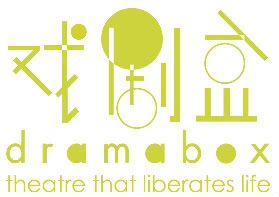
戏剧盒是新加坡最富代表性的现代华语剧团。它也是非盈利的慈善团体。成立于1990年,它凭着关怀社会的人文精神,对公民教育的积极态度,获得了广大观众的肯定。我们的演出除了富娱乐性和趣味性,也常常让观众深思并省思。
Drama Box is Singapore's most prominent contemporary Mandarin theatre company. It is a professional non-profit company with charity status. Formed in 1990, it has since gained a respectable reputation for its acute sensitivity and perception in heightening social awareness and civic responsibility. Our productions remain fun and entertaining, yet thought-provoking and reflective.
戏剧盒omy部落格告诉你戏剧盒的点点滴滴!
白色空间 之 编剧系列
继2001年演员训练工作室《白色空间》后,戏剧盒再度出发为本地中文戏剧界开拓新能量,推出为期18个月的剧本孵化室 --《白色空间之编剧系列》。通过新旧剧本创作者的定期沟通与互动,催生新一波原创剧本,捕捉属于我们时代的脉动。
Blanc Space
The Blanc Space was inaugurated in 2000 to provide a training platform for performers. In 2007, the company expanded Blanc Space to include programmes for budding directors and aspiring playwrights.


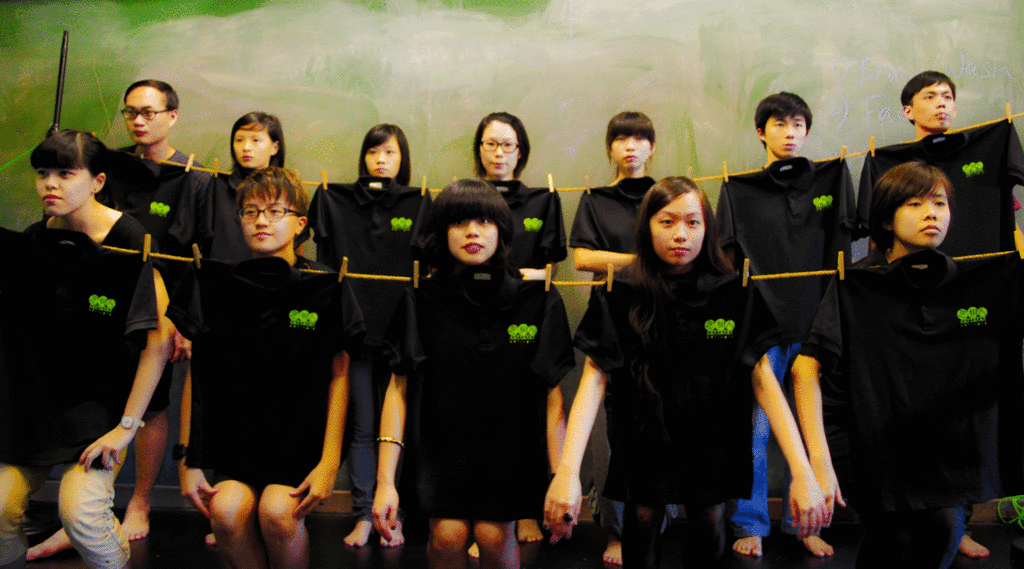
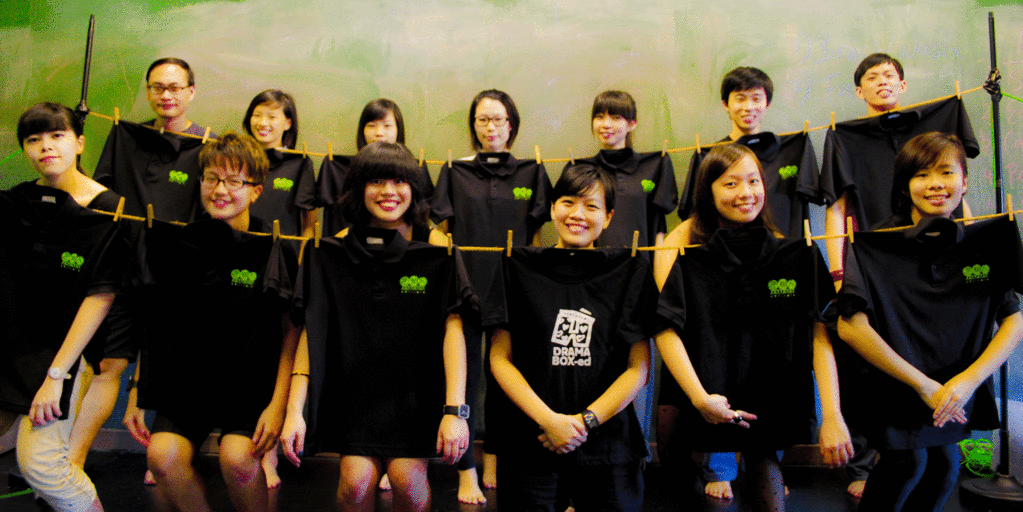
 母性泛滥; 热爱人
母性泛滥; 热爱人 长着翅膀
长着翅膀 我在南大念心理学科。心理学对我来说,跟戏剧的妙处不相上下。
我在南大念心理学科。心理学对我来说,跟戏剧的妙处不相上下。 就读南洋理工大学。
就读南洋理工大学。 法律系学生。
法律系学生。 正值后青春期的门槛状态。
正值后青春期的门槛状态。 热爱的东西太多,拥有的时间有限。
热爱的东西太多,拥有的时间有限。 在国大读书.
在国大读书. 南大中文系毕业。非常健忘,经常丢三落四。
南大中文系毕业。非常健忘,经常丢三落四。 在2009年毕业于新加坡国立大学的科学系。由于我目前还在学习编剧和导戏的工作,未能有值得一提的代表作。
在2009年毕业于新加坡国立大学的科学系。由于我目前还在学习编剧和导戏的工作,未能有值得一提的代表作。 爱与剧场牵手,与社会学接吻。
爱与剧场牵手,与社会学接吻。 艺树人面试那一天,我告诉许慧铃:"其实我想要做的是电影。"
艺树人面试那一天,我告诉许慧铃:"其实我想要做的是电影。" 












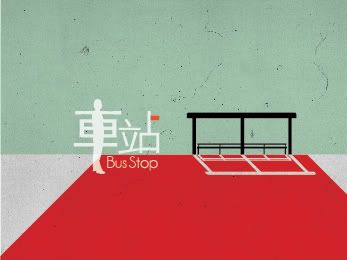

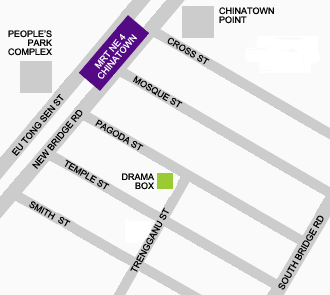

2 条评论:
雪梅说的对!其实新加坡的种族和谐对我来说都是很表面。我还是会看到别人或自己歧视其他种族的人。虽然是在自己在心里做的一些comments, 可是,想想,这种silent conflict 才更可怕。
我曾经在巴士上, 路途中,我发现自己是搭客当中唯一的华人。 当时,我顿时觉得一点孤独与不自在!这种感觉很不舒服!):也许,这就是那些印度人在新加坡的感受吧!
想想,如果我们在印度,我们也会被他们歧视啊!我们只是很幼稚地以“多”欺“少”!
如果,大家能了解这些“建筑工人" 独自在异国打拼,却还要承受别人的不欢迎的种种压力,我们这个社会就不会那么的幼稚了!
oh! 还有,最近我的学校有给我们看一部短片 《过客》。 忘记导演是谁了。但它说导演自己在小印度和他对种族歧视的感想。很不错看!
大家如果能在网上找到,就去看一看吧!如果方便也可以把网址告诉我,因为我要再看一次!哈哈。
发表评论
订阅 博文评论 [Atom]
<< 主页